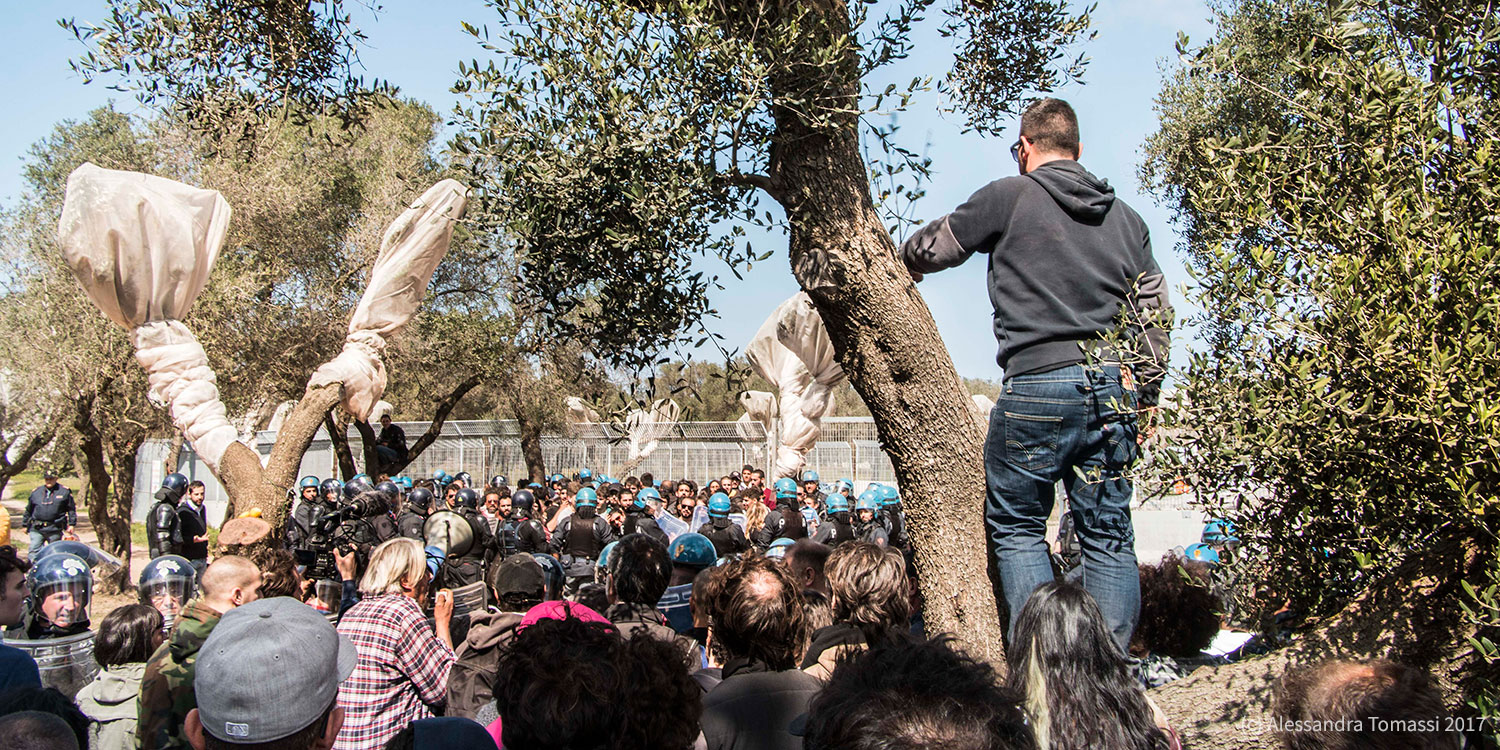Italian authorities overrun communities in a bid to enable Europe’s dash for gas
In a last minute attempt to force facts on the ground, the Italian authorities have enabled the removal of a group of olive trees to make room for a future construction site of the Trans-Adriatic Pipeline (TAP), despite an earlier agreement between the company and local institutions. Nevertheless, the company has not been able to clear the site by the official deadline and the residents have vowed to step up their protest against the largest energy project the EU is currently pursuing.
8 May 2017

Melendugno residents facing police forces in March 2017. (c) Alessandra Tomassi 2017
In a last minute attempt to force facts on the ground, the Italian authorities have enabled the removal of a group of olive trees to make room for a future construction site of the Trans-Adriatic Pipeline (TAP), despite an earlier agreement between the company and local institutions. Nevertheless, the company has not been able to clear the site by the official deadline and the residents have vowed to step up their protest against the largest energy project the EU is currently pursuing.
The 3500 kilometers long Southern Gas Corridor (SGC) is intended to bring to Europe 10 billion cubic meters of gas per year from Azerbaijan via Georgia, Turkey, Greece, Albania, and Italy. TAP, the western leg of the SGC, is planned to reach the shores of southern Italy, near the town of Melendugno.
Yet, local communities on Italy’s southern coast fear the massive pipeline and its accompanying infrastructure could have irreversible impacts on the peaceful Apulia region whose economy is dependent on tourism and agriculture.
In late March the company, TAP Ag, started works intended to uproot over 200 olive trees to make room for the construction of the western end of the pipeline. This move was met with fierce but peaceful popular resistance, and in late April, after a series of meetings with the mayor of Melendugno and the local prefect, the company decided to suspend the works ahead of the official deadline of April 30th, until the end of the 2017 tourist season.
Still, in the last week of April the company’s excavators unexpectedly arrived at the site late at night, after police had breached the protest barricades, blocked nearby roads and rounded up local activists. Although 11 more trees were removed, the company will not be able to commence construction as 16 other ancient olive trees, which have a legal protection as natural monuments, remain at the site.
The local residents have repeatedly stressed that their concerns extend well beyond the local olive grove. They have campaigned against the TAP pipeline since nearly five years, as they perceive it as an imposed mega-project, bound to impact people and the environment in Europe and beyond. Feeling betrayed by their own state, a few Melendugno residents have started a hunger strike demanding the government to engage in an open dialogue on its support to the project.
But the people in Melendugno are not alone in opposing this pipeline. Farmers and land owners in Greece have also been protesting the pipeline project on very similar grounds, and residents in more than 30 communities across Albania, whose livelihoods depend on agriculture, have been raising similar concerns about the removal of vineyards, plum trees and olive groves for the construction of the TAP pipeline.
In parallel, the project has raised serious concerns in terms of transparency. Already contested for its dodgy links to the Azeri regime, the pipeline was recently the subject of an extensive investigation conducted by the Italian magazine L’Espresso. Shedding light on TAP and TANAP (the Trans-Anatolian Pipeline) and the network of state-owned companies with links to Vladimir Putin, Recep Tayip Erdogan and Ilham Aliyev as well as Russian oligarchs involved in the projects, the investigation reinforces earlier concerns that the project was designed to serve the interests of a few, at citizens’ expense.
Gianluca Maggiore, spokesperson of the No TAP Committee, says: “The local residents have made it clear we will not allow this destructive project to go ahead. Our opposition has gained broad support across the country and beyond, proving this project is simply not feasible. There are still numerous outstanding technical issues around the next phases of the works and their compliance with the requirements of the environmental impact assessment. However, we don’t oppose the TAP project just to defend our lands. Designed to fill the pockets of three authoritarian regimes with dismal human rights record – in Azerbaijan, Russia and Turkey – this project prioritises geopolitical games over the actual needs of people and the environment.”
Elena Gerebizza, campaigner with the Italian NGO Re:Common , says: “The Italian government and the European Commission should acknowledge the reasons behind the peaceful resistance to TAP in Italy for years now, and review the political and financial support to the project. TAP is not bringing any benefits to Italian and EU citizens, who are rather asked to bear the costs of this mega-project”.
Xavier Sol, from the European civil society coalition Counter Balance, says: “The situation on the ground looks very far from the rosy picture described by the promoters of the project. It is high time for the European Commission to stop supporting this project which is faced with local resistance, is not in line with the EU’s climate commitments under the Paris Agreement and supports oppressive regimes.”
For more information contact:
Gianluca Maggiore, local NO TAP committee spokesperson
+39 339 684 7706
Elena Gerebizza, Energy Campaigner Re:Common
egerebizza@recommon.org
+39 340 670 53 19
Xavier Sol, Director Counter Balance
xavier.sol@counter-balance.org
+32 2 893 08 61
Never miss an update
We expose the risks of international public finance and bring critical updates from the ground – straight to your inbox.
Institution: EIB
Theme: Energy and climate
Location: Italy
Project: Southern Gas Corridor / Euro-Caspian Mega Pipeline
Tags: Melendugno | NoTAP | fossil fuels | gas | pipeline | protest
